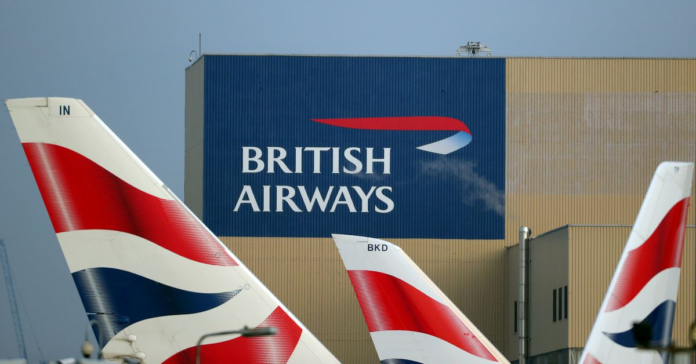[1/2] British Airways logos are seen on tail fins at Heathrow Airport in west London, Britain, February 23, 2018. REUTERS/Hannah McKay
July 10 (Reuters) – European airports are in the midst of another busy summer as passenger numbers globally recover to pre-pandemic levels, while airline and airport staff continue to negotiate on wages.
The travel industry is on high alert for disruption after Europe’s peak season last year was hit by cancellations, causing chaos at airports. This summer, air traffic control issues are likely to be the weak spot, according to warnings from Eurocontrol, which manages European airspace.
Here is a summary of recent developments:
BELGIUM
Ryanair (RYA.I) pilots in Belgium will strike on July 15-16 in demand of higher wages and better working conditions, their union said on July 7. The strike could affect around 140 flights from Charleroi airport, but it is yet unclear how many pilots will join and how many flights will need to be cancelled.
BRITAIN
EasyJet (EZJ.L) has axed 2% of its summer flight schedule, affecting holiday plans of 180,000 customers. The British airline said on July 10 it had plenty of crew and pilots but worries over air traffic control challenges across Europe meant it had cancelled 1,700 flights, mostly from London’s Gatwick airport, for the rest of July and August.
Heathrow Airport security workers on June 23 called off 31 days of strikes planned at Britain’s busiest hub. Over 2,000 staff accepted an improved pay offer for a rise of between 15.5% and 17.5%.
At Birmingham Airport, around 100 security officers and terminal technicians will begin continuous strike action from July 18. The strikes will severely impact the airport’s security and terminal maintenance, leading to flight delays, the Unite union said.
Unite has also said that workers who aid passengers with mobility challenges at Glasgow Airport would take two 24-hour strikes on July 6 and July 11.
FRANCE
Air traffic controller (ATC) strikes in France have led to delays and limited flights across the country, causing more air space congestion in Europe.
Most recently, French aviation regulator asked carriers to cancel a third of their flights from the Paris-Orly airport on June 6 due to a planned ATC strike. It also asked them to reduce flights by 20% at Lyon, Marseille, Nice, Toulouse, Bordeaux and Nantes, and urged passengers to postpone trips if possible.
On June 6, Ryanair (RYA.I) said it had to cancel 400 flights due to the 36-hour strike, most of them overflights not going to France.
ITALY
Italy’s air traffic control company ENAV (ENAV.MI) told Reuters there would be no strikes in the Italian air transport sector between July 27 and Sept. 5 due to a summer exemption provided for in the industry regulations.
PORTUGAL
Easyjet’s (EZJ.L) cabin crew in Portugal will go on strike between July 21 and July 25 after 90% of workers represented by the SNPVAC union rejected the airline’s proposal, local media reported on July 6.
SPAIN
Pilots at Iberia Regional Air Nostrum, who had been striking every Monday and Friday since Feb. 27, went on a daily indefinite strike from June 6 amid a pay dispute. As of July 4, Iberia said on its website that flights could be affected and offered flexible fares for some passenger travelling until July 6 on routes operated by Air Nostrum.
Air Europa pilots in Spain also went on a two-week strike on June 19.
Spain has said it expects to receive more tourists in the summer of 2023 than before the COVID-19 pandemic.
SWEDEN
The Swedish Transport Workers’ Union on June 30 withdrew the strike and blockade by airport controllers, planned to start on July 3, after reaching a new surveillance and security agreement.
SWITZERLAND
Geneva Airport reached a deal with public service staff on June 30 to end a strike over pay, after it saw its air traffic halted for around four hours on the same morning. The striking workers included security and emergency staff.
Compiled by Tiago Brandao, Pierre John Felcenloben, Antonis Triantafyllou and Romolo Tosiani; Editing by Milla Nissi
Our Standards: The Thomson Reuters Trust Principles.




